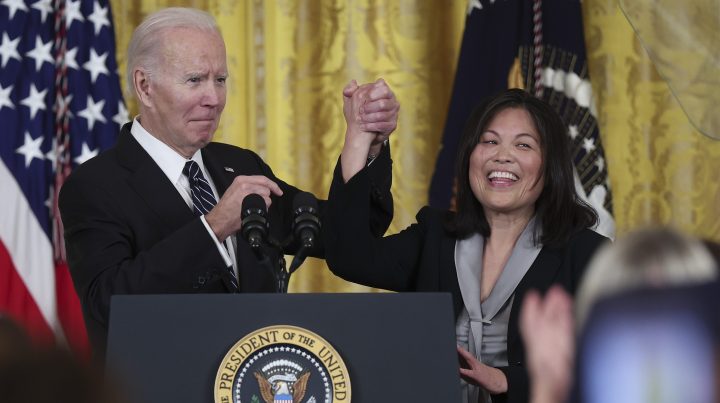
How labor nominee’s worker advocacy history informs her work today
How labor nominee’s worker advocacy history informs her work today

Julie Su, deputy secretary of the Labor Department, is President Joe Biden’s nominee to head the Department of Labor. But Su is struggling to get the necessary votes for confirmation in a divided Senate. She goes before the Senate Committee on Health, Education, Labor and Pensions on April 20.
Mel Leonor Barclay, a national politics reporter for The 19th, looked back at Su’s days as a labor attorney in the ‘90s, particularly her role in the landmark garment sweatshop case in 1995 involving Thai immigrants held captive in El Monte, California.
The following is an edited transcript of their conversation.
Mel Leonor Barclay: So, these were 72 Thai immigrants, mostly women, who were working in sweatshop conditions in El Monte, California. The one worker that I spoke to told me that she was paid between 2 to 4 cents to sew pockets onto garments. She worked in the same place where she lived, really long shifts, and the money that she was paid was then used to buy food and toiletries and other essentials from a shop that was run by the same people that ran the sweatshop. The sweatshop really inflated prices. So, it really was slave-like conditions. The windows and the doors were boarded up. There were security guards outside, so they were not able to leave. And eventually federal agents were able to release and free these folks from these working conditions.
Kimberly Adams: And what did Julie Su do for them?
Leonor Barclay: So, the first thing that Julie Su was able to do was to guarantee their release from an immigration detention center. After they were released, the one worker I [spoke with] talked about Julie helping her find a new job. And it was a job where she stayed at for 11 years, also sewing. And then that’s where this landmark case really starts. Julie worked with these workers to figure out how to guarantee back wages for them. And Julie built a case that not only held responsible the people that were running the sweatshop, but also all of the businesses up and down the line that were benefiting from their work.
Adams: What does Julie Su’s role in all of this tell us about her views and how she might do her job if confirmed as labor secretary?
Leonor Barclay: You know, she wrote an essay in 2021 about the El Monte case. And in that essay, she talks about watching her parents, who are both Chinese immigrants, arrive in this country and try to navigate work having limited English and feeling that a lot of employers are predatory. She has talked about that being an inspiration for her to advocate for vulnerable workers. And people who support her to be in this position say that that passion could, at this really high level in the federal government, could just be an advocate for the most vulnerable workers in America. And they really believe that voice is really necessary right now within the Labor Department.
Adams: Why do you think Biden is picking someone like Su right now?
Leonor Barclay: I think one really interesting thing about this story is that the same folks that are advocating for Julie Su to lead the Labor Department right now were doing the same when the president was first elected. And he ultimately went with a different labor secretary. And they feel that just her time is due. But at the same time, the country after the pandemic is in a really interesting place when it comes to workers in the service industry and the lowest-paid workers. I spoke to one advocate who said that a lot of workers, especially in the restaurant industry, are walking off the job just demanding better wages. And she feels that the pandemic empowered these workers to do that. She believes that there’s this really crucial moment of opportunity, and that somebody like Julie Su, who is interested in these kinds of workers, could help the administration seize this opportunity and help increase wages and benefits for workers.
Adams: So, who is against her confirmation and why?
Leonor Barclay: The opposition is really centered on business groups. They believe that she is somebody who would be hostile to small businesses. Right now, the Labor Department is working through two different rules that would impact businesses and that are being debated, and they just believe that the perspective that she brings to the job would harm their efforts.
Adams: How is Su and how is the Biden administration responding to those concerns?
Leonor Barclay: Well, I spoke to one Su supporter who said that Julie Su is not hostile to business. She believes in uplifting businesses who take the high road and treat their workers fairly and who pay fair wages. And so, I think to them, if you’re a business that is doing right by their workers, Julie Su shouldn’t worry you.
There’s a lot happening in the world. Through it all, Marketplace is here for you.
You rely on Marketplace to break down the world’s events and tell you how it affects you in a fact-based, approachable way. We rely on your financial support to keep making that possible.
Your donation today powers the independent journalism that you rely on. For just $5/month, you can help sustain Marketplace so we can keep reporting on the things that matter to you.











